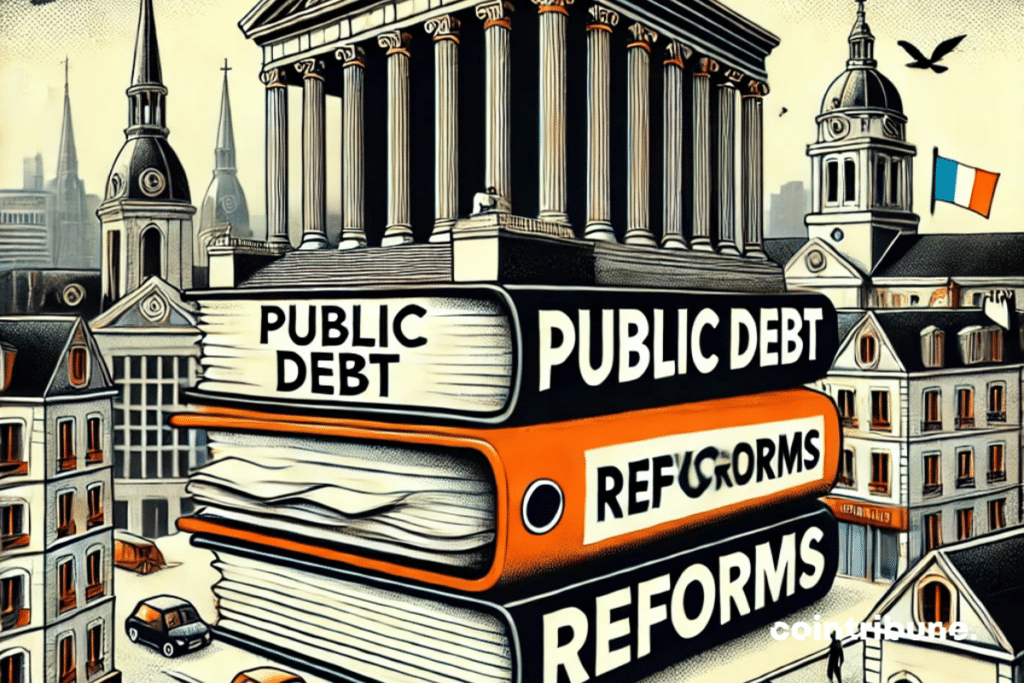Finance: 150 Billion In Savings Or Guaranteed Crisis For France!
France is facing an unprecedented financial deadlock, with public debt estimated at 110.6% of GDP and a deficit well beyond European criteria. Indeed, the time for half-measures seems over, and the Institut Montaigne, an influential Parisian think tank, is sounding the alarm with its new report entitled “Public Finances: The End of Illusions.” This document proposes bold reforms to save nearly 150 billion euros by 2050.

An Unsustainable Debt: The Point of No Return
France is sinking into a deep budgetary crisis with a public deficit considered a ticking time bomb, where the level of indebtedness becomes a major obstacle to managing national priorities. According to the Institut Montaigne, the public debt, which now stands at 110.6% of GDP, reflects a situation “unsustainable and incompatible with financing the current and future priorities of the country.” In comparison, the eurozone average is 88.6%, a significant gap that illustrates the magnitude of the French problem.
“We must imperatively make a structural budgetary effort of more than 120 billion euros if we want to correct the course,” states François Ecalle, president of the Fipeco association and co-author of the report. These statements shed more light on the severity of the situation and the need to take immediate action.
The issue is not merely managing the debt, but the state’s ability to finance vital priorities such as ecological transition, education, or national defense. The report highlights a chronic problem with the efficiency of public spending, with a system of managing state funds failing to deliver results commensurate with investments. Thus, the Institut Montaigne calls for a complete redefinition of the role of the welfare state to rationalize and make public spending more efficient, so as not to deepen the debt further.
Controversial Reforms for an Uncertain Future
To address this critical situation, the Institut Montaigne proposes drastic reforms in the economic field, some of which are already subject to debate. Among the key proposals is postponing the retirement age to 66 by 2050, a measure that could alone generate 30 billion euros in savings. In parallel, freezing pension payments for four years would allow an additional 29 billion euros to be released by 2029. These measures, while potentially economically saving, risk facing fierce opposition, notably from retirees, who form a solid electoral base in France. “These reforms are necessary, but their implementation will be politically costly,” warns Lisa Thomas-Darbois, director of French studies at the Institut Montaigne.
The health sector, one of the most expensive in the OECD, is also targeted by reforms aimed at optimizing expenditures. Rationalizing the prescriptions of generic drugs, reducing unnecessary hospital stays, and better controlling daily allowances could allow savings of about 28 billion euros. But, once again, these reforms are politically risky. Resistance from healthcare professionals and pharmaceutical lobbies could delay or block their implementation. The coming weeks will be decisive in assessing the government’s capacity to implement these reforms without further destabilizing the French social fabric.
The Institut Montaigne presents an ambitious recovery plan, but its implementation will be complicated. The proposed reforms, essential to restoring public finances, risk provoking strong opposition. Faced with a divided public opinion and a National Assembly not inclined to support such unpopular measures, the executive will therefore have to show resilience and determination. Moreover, we hope that the tax rules related to cryptos in France do not enter into these reforms.
Maximize your Cointribune experience with our "Read to Earn" program! For every article you read, earn points and access exclusive rewards. Sign up now and start earning benefits.
Diplômé de Sciences Po Toulouse et titulaire d'une certification consultant blockchain délivrée par Alyra, j'ai rejoint l'aventure Cointribune en 2019. Convaincu du potentiel de la blockchain pour transformer de nombreux secteurs de l'économie, j'ai pris l'engagement de sensibiliser et d'informer le grand public sur cet écosystème en constante évolution. Mon objectif est de permettre à chacun de mieux comprendre la blockchain et de saisir les opportunités qu'elle offre. Je m'efforce chaque jour de fournir une analyse objective de l'actualité, de décrypter les tendances du marché, de relayer les dernières innovations technologiques et de mettre en perspective les enjeux économiques et sociétaux de cette révolution en marche.
The views, thoughts, and opinions expressed in this article belong solely to the author, and should not be taken as investment advice. Do your own research before taking any investment decisions.